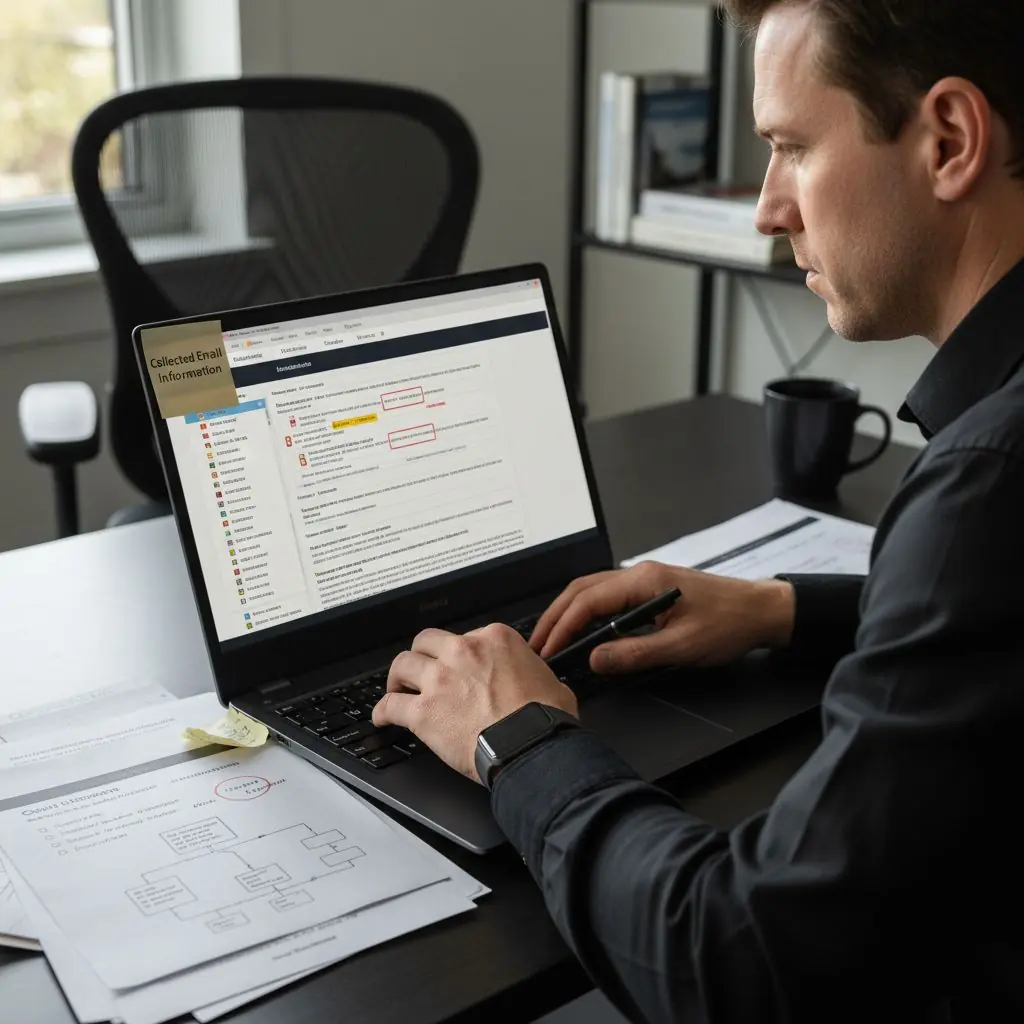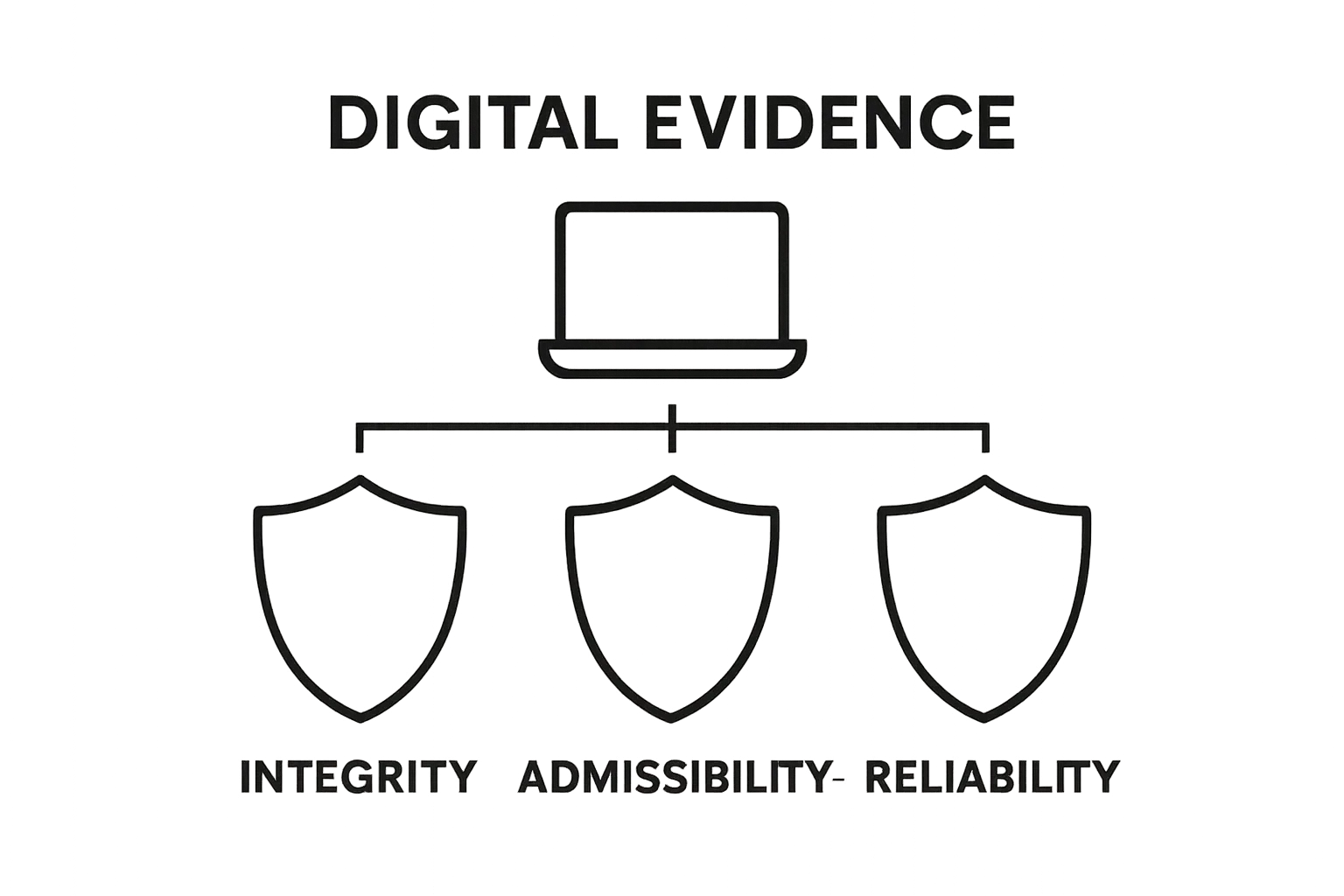How IT Forensics Can Help Uncover The Digital Truth
IT Forensics Can Help Legal Practitioners in the UK
In today’s digital world, almost every piece of evidence — from emails and documents to chat logs and cloud data — is stored or transmitted electronically. When an investigation requires uncovering the truth behind these data trails, IT Forensics becomes indispensable.
 Also known as Computer Forensics, IT Forensics is the cornerstone of modern Digital Forensics, providing the structured methodology and technical expertise required to identify, preserve, analyse, and present digital evidence in a legally defensible manner.
Also known as Computer Forensics, IT Forensics is the cornerstone of modern Digital Forensics, providing the structured methodology and technical expertise required to identify, preserve, analyse, and present digital evidence in a legally defensible manner.
At Computer Forensics Lab, our experts provide comprehensive IT Forensics services across the UK, assisting lawyers, solicitors, law enforcement, company directors, and private individuals in cases involving cybercrime, data breaches, deleted data recovery, and litigation support.
What Is IT Forensics?
IT Forensics is the scientific process of examining computers, servers, storage devices, and networks to uncover, recover, and interpret digital evidence. The goal is to reconstruct events, identify those responsible, and ensure findings can stand up in court.
It encompasses several overlapping disciplines, including:
- Computer and network forensics
- Cloud and server analysis
- File system and memory examination
- Log analysis and intrusion detection
The results of IT Forensics investigations are often pivotal in resolving disputes, criminal cases, and corporate incidents. Every byte of information — from deleted emails to hidden logs — can tell a story when properly preserved and analysed.
The Relationship Between IT Forensics and Digital Forensics
While “Digital Forensics” covers the broader ecosystem of devices — such as mobile phones, tablets, cloud services, IoT devices, and even vehicle systems — IT Forensics specifically focuses on computers, networks, and data infrastructure.
In many investigations, IT Forensics forms the backbone of a larger digital investigation, laying the groundwork for correlating evidence from multiple sources.
For example:
- A server log analysed during IT Forensics may link to a mobile device extraction from Mobile Phone Forensics.
- A network capture may confirm when and how sensitive information was exfiltrated.
- A workstation examination may identify malware, deleted documents, or misuse of company assets.
Without robust IT Forensics processes, digital evidence risks contamination, alteration, or inadmissibility — undermining the integrity of the entire case.
Core Principles of IT Forensics
Effective IT Forensics rests on four fundamental principles that guide every investigation:
- Identification
Determine potential sources of evidence, including hard drives, servers, logs, network captures, and removable media. Early scoping ensures investigators target relevant systems while minimising disruption.
- Preservation
Preserve data in its original state using forensic imaging and secure handling procedures. This includes creating bit-for-bit copies, documenting chain of custody, and using write-blockers to prevent accidental modification.
- Analysis
Analyse digital artefacts using forensic software and manual methods to identify activity patterns, deleted files, user actions, timestamps, and anomalies.
- Presentation
Present findings clearly and credibly, often in the form of detailed forensic reports or expert witness testimony. The emphasis is on transparency, reproducibility, and neutrality. At Computer Forensics Lab, these principles underpin every service we deliver — from corporate investigations to criminal casework — ensuring our findings remain admissible and defensible under scrutiny.
The IT Forensics Process: Step-by-Step
A typical IT Forensics investigation involves a series of structured phases:
- Initial Consultation and Scoping – Understanding the nature of the incident or allegation, identifying key data sources, and defining objectives.
- Evidence Acquisition – Creating verified forensic images of all relevant devices, drives, and cloud data.
- Data Examination – Searching for deleted, hidden, or encrypted content, as well as identifying timelines, communications, and file movements.
- Analysis and Interpretation – Correlating evidence to reconstruct user actions or security events.
- Reporting and Testimony – Producing detailed reports for legal, corporate, or regulatory use — and, where required, providing expert witness support in court.
Every step is meticulously documented, preserving the chain of custody and ensuring the evidence remains credible and tamper-proof.
Tools and Techniques Used in IT Forensics
The tools of IT Forensics are as diverse as the digital environments they examine. Common technologies and methods include:
- Disk Imaging – Using write-blockers and forensic software (e.g., EnCase, FTK, X-Ways) to create verified copies of data storage devices.
- Registry and File System Analysis – Reviewing Windows, macOS, and Linux systems for user artefacts, configuration changes, and deleted data.
- Log and Network Forensics – Investigating firewall, proxy, and application logs to trace intrusions or unauthorised access.
- Cloud and Virtual Environment Forensics – Acquiring and analysing data from Office 365, Google Workspace, AWS, and virtual machines.
- Malware and Memory Forensics – Identifying malicious code, rootkits, or live system activity through memory dumps and sandboxing.
- Automated AI-based Filtering – Prioritising relevant evidence using intelligent indexing and content recognition.
The correct combination of these tools allows investigators to reconstruct events, timelines, and user behaviour with precision.
Applications of IT Forensics
IT Forensics supports a wide range of investigations across both public and private sectors. Key applications include:
- Cybercrime Investigations
IT Forensics helps law enforcement and private investigators trace hacking, malware attacks, and online fraud. By analysing server logs, command-and-control connections, and digital footprints, investigators can attribute attacks to specific individuals or groups.
- Corporate and Employment Investigations
Companies use IT Forensics to detect insider threats, intellectual property theft, and policy violations. For example, forensic analysis can reveal when sensitive files were copied to USB drives or cloud accounts.
- Civil and Criminal Litigation
Solicitors and barristers rely on IT Forensics reports as part of e-disclosure or e-discovery processes. Evidence may include deleted communications, document metadata, or tampering of records.
- Incident Response and Breach Analysis
When a security incident occurs, IT Forensics provides post-incident clarity: identifying how intruders entered, what data was accessed, and how to prevent future breaches.
- Data Recovery and Compliance
Forensic data recovery enables the retrieval of deleted or damaged information, often crucial for GDPR compliance or internal audits.
Legal and Ethical Foundations of IT Forensics
Because IT Forensics often deals with sensitive data, legal and ethical compliance is paramount.
Professionals adhere to strict frameworks that ensure integrity and confidentiality throughout the investigation.
Key Legal Considerations
- Chain of Custody – Maintaining continuous documentation from evidence collection to presentation.
- Admissibility of Evidence – Ensuring forensic methods meet legal standards under the UK’s Criminal Procedure Rules and the Civil Evidence Act.
- Data Protection – Operating in compliance with the UK Data Protection Act 2018 and GDPR.
- Disclosure Obligations – Ensuring that digital evidence, whether helpful or harmful to a case, is disclosed appropriately.
Ethical Responsibilities
IT Forensic specialists must remain impartial, objective, and transparent. Their duty is to the truth, not to any party in the dispute.
At Computer Forensics Lab, we follow ACPO and NIST forensic principles, ensuring every investigation meets the highest professional and evidential standards.
Challenges in Modern IT Forensics
As technology evolves, IT Forensics faces increasing complexity. Some of today’s key challenges include:
- Encryption and Anti-Forensic Techniques – Sophisticated encryption tools and obfuscation methods make access and interpretation difficult.
- Cloud and Cross-Jurisdictional Data – Evidence may be spread across global servers, raising questions about legal authority and access rights.
- Data Volume and Volatility – The sheer size of corporate datasets, combined with ephemeral logs and memory data, demands advanced automation and rapid preservation.
- BYOD and Remote Work – The rise of personal devices and remote systems increases the difficulty of isolating and securing relevant data sources.
- Emerging Technologies – Artificial intelligence, blockchain, and IoT devices require new forensic approaches and toolsets.
To meet these challenges, IT Forensics must remain adaptive — combining established methodology with innovative analysis and continuous learning.
The Future of IT Forensics
The future of IT Forensics will be defined by deeper integration with AI-driven analytics, machine learning, and automated forensic workflows.
Key trends include:
- Predictive Forensics: Using AI to anticipate and identify anomalies before incidents occur.
- Cloud-Native Forensics: Developing new acquisition methods for distributed environments.
- Integrated Forensic Readiness: Designing systems to be “forensic-ready” — capturing key artefacts automatically in case of future investigations.
- Collaboration with Cybersecurity Teams: Forensics and cybersecurity will merge closer, creating a unified approach to prevention, detection, and investigation.
These advances will make IT Forensics faster, more scalable, and increasingly indispensable to business continuity and justice.
Computer Forensics Lab and IT Forensics in the UK
At Computer Forensics Lab, we specialise in providing end-to-end IT Forensics services designed to uncover the truth behind digital events — efficiently, confidentially, and with full legal integrity.
Our capabilities include:
- Computer and Laptop Forensics
- Server and Network Forensics
- Email and Document Analysis
- Cloud Data and Virtual Machine Examinations
- Data Recovery and Reconstruction
- Expert Witness Testimony
We also integrate IT Forensics with other specialist services, such as our dedicated Mobile Phone Forensics practice — supporting evidence correlation across phones, computers, and cloud accounts.
Our clients include:
- Lawyers and Solicitors preparing for litigation or disclosure.
- Law Enforcement Agencies investigating criminal activity.
- Company Directors and HR Teams managing internal investigations or data breaches.
- Private Individuals seeking recovery of deleted messages, emails, or evidence of misconduct.
Every engagement is handled with absolute confidentiality and a focus on accuracy, transparency, and admissibility.
Why Choose Computer Forensics Lab for IT Forensics
- Proven Expertise: Experienced analysts with backgrounds in law enforcement and cyber investigation.
- Court-Ready Reporting: Clear, detailed reports written in plain English, suitable for legal submission.
- Cutting-Edge Technology: Access to industry-leading forensic tools such as Cellebrite, GreyKey, and EnCase.
- Nationwide Coverage: Services available across England, Wales, Scotland, and Northern Ireland.
- Forensic Integrity: Every step follows the principles of evidence preservation and chain of custody.
IT Forensics is far more than a technical process — it is the foundation of truth in the digital age. By combining meticulous evidence handling with advanced analytical methods, IT Forensics provides clarity, accountability, and justice in an increasingly complex digital world. As the backbone of Digital Forensics, it supports investigations into everything from corporate misconduct to cybercrime and legal disputes. Whether you’re a solicitor preparing evidence, a company director investigating data misuse, or a private individual seeking proof, Computer Forensics Lab delivers the expertise and integrity you can trust.
